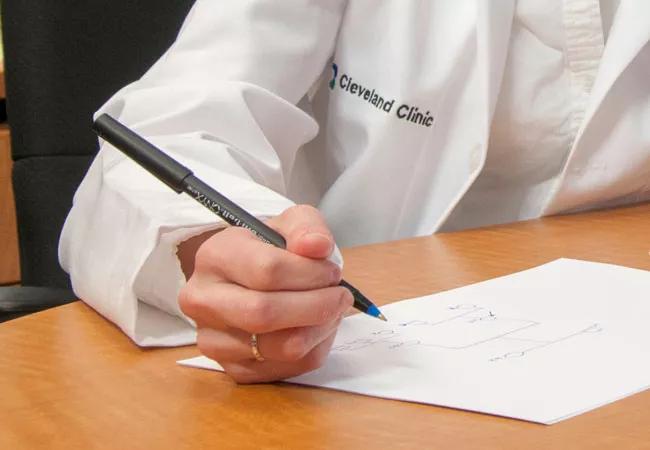Clinic offers cost savings and convenience

Advanced practice nurses play a vital role in healthcare delivery at Cleveland Clinic, and nowhere is that more evident than in the hospital system’s survivorship clinic for patients with head and neck cancer (HNC). Launched several years ago, the clinic is run by two nurse practitioners – Bridgett Harr, CPN, from the Radiation Oncology Department, and Joanna Bodmann, CNP, from the Medical Oncology Department.
Advertisement
Cleveland Clinic is a non-profit academic medical center. Advertising on our site helps support our mission. We do not endorse non-Cleveland Clinic products or services. Policy

Bridgett Harr, CPN
All HNC patients who have been treated definitively for their disease and show no evidence of disease (NED) receive follow-up care at the survivorship clinic. “We integrate the clinic into their routine follow-up to provide patients with a treatment summary and survivorship plan that addresses the treatment they received and what they can expect in the future,” Harr explains.
When the survivorship clinic first began, Harr and Bodmann only saw human papilloma virus positive oropharyngeal patients. The value of the clinic was clear, and it recently expanded to include all HNC patients. Physicians typically refer patients to the clinic after their three-month post-treatment appointment. “During that appointment, they have post-treatment scans and see otolaryngology, medical and radiation oncology physicians,” says Harr. “If they are presumed NED, they are sent our way.”
During a patient’s first visit to the clinic, the nurse practitioners review the following:
“Even though treatment is finished, side effects may linger and many of our patients have an increase in depression and anxiety post-treatment,” says Harr. “Having this opportunity to go over their disease and treatment gives patients the opportunity to reflect on what they have been through as well as validate their feelings.”
Advertisement
Patients typically have follow-up appointments with one of the nurse practitioners every three months for two years. “This practice model can help improve healthcare value for these patients,” says Harr. “Integrating the survivorship clinic into their routine follow-up is cheaper – no extra co-pay – and more convenient for patients.”
Advertisement
Advertisement

First-of-its-kind research investigates the viability of standard screening to reduce the burden of late-stage cancer diagnoses

Global R&D efforts expanding first-line and relapse therapy options for patients

Study demonstrates ability to reduce patients’ reliance on phlebotomies to stabilize hematocrit levels

A case study on the value of access to novel therapies through clinical trials

Findings highlight an association between obesity and an increased incidence of moderate-severe disease

Cleveland Clinic Cancer Institute takes multi-faceted approach to increasing clinical trial access 23456

Key learnings from DESTINY trials

Overall survival in patients treated since 2008 is nearly 20% higher than in earlier patients